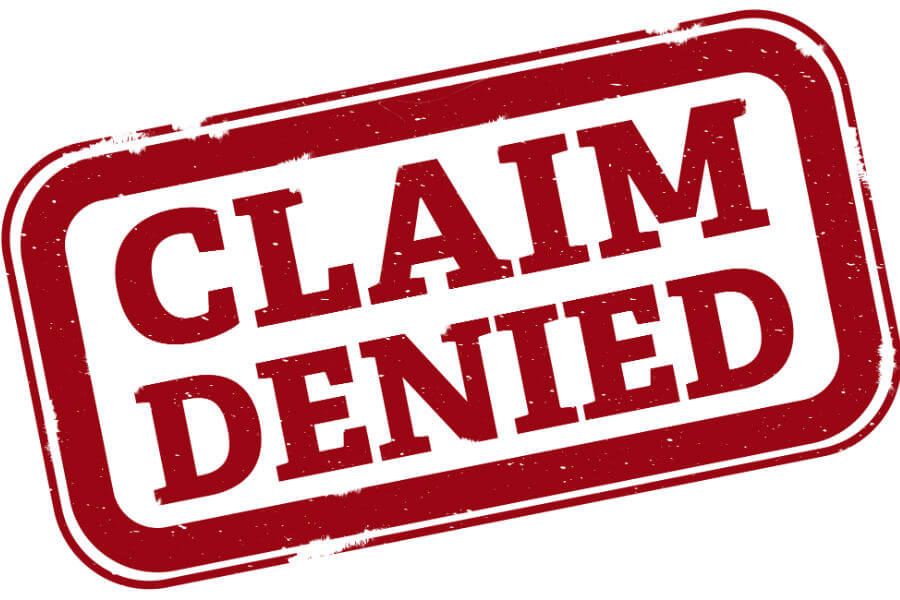
While employers are legally required to provide workers’ compensation insurance in the event that an employee is injured at work, employees may not always be able to count on their workers’ compensation providers to do what is right. The insurance company may attempt to avoid and and all responsibility by denying you the support you need to cope with any and all medical issues you have acquired at work.
However, even if the insurance company denies your claim, it does not mean that you should give up or that your case is over. Workers’ compensation insurance companies are required to pay the whole of any and all necessary medical treatment you may need due to your work related injury.
While there are exceptions, which we will also discuss, If you feel you are well within your legal right to workers’ compensation for a work related injury and your workers’ compensation is refusing to pay there are a few different steps you can take. It is important to note that there are exceptions which grant the workers’ compensation insurance company the right to deny a claim, which we will also discuss.
What to do When Workers’ Compensation Won’t Pay
File for an Appeal
Receiving a denial letter from the workers’ compensation insurance company can be very frustrating, especially when you know you are well within your rights to draw your workers’ compensation, but it does not have to mean that it is over. You have the right to dispute the denial and file for an appeal. Your denial letter should include a description and explanation of your workers’ compensation coverage, when and how to appeal the claim denial, and the deadline to file the appeal. It is imperative to file your appeal before the deadline in order to have a chance at receiving your workers’ compensation insurance benefits.
You may be required to find more witnesses and/or gather further evidence showing that your work related injury is relevant and does, in fact, require workers’ compensation benefits. It is highly recommended that you find an attorney to assist you through this very complicated and frustrating process.
Request a Hearing
Even if your workers’ compensation benefits claim is accepted, you still may have to dispute decisions made by your workers’ compensation insurance company. Possible decisions that may need to be disputed include but are not limited to:
- Weekly wages
- Returning to work
- Vocational training
- Disability settlement
If you find yourself disagreeing with any decisions that the workers’ compensation insurance company made on your claim, you can request an Administrative Hearing before the appeals board. This process will place the decision in the hands of an administrative judge instead of the workers’ compensation insurance company.
Be sure you are ready to properly argue your case before the board. This can usually be handled without legal help, however, there are situations when you will require expert legal advice and representation. If you are unsure whether or not you require representation, or if you need answers to tricky questions, most attorneys offer a free consultation.
Hire an Attorney
The workers’ compensation process can be extremely stressful, and when your claim has been wrongfully denied, it can be even more stressful. Hiring an attorney can help ease the pain and frustration that comes with filing an appeal. Be sure to do your research and choose an attorney that you can trust to properly handle your case and get you the benefits you rightfully deserve.
Reasons Why Your Claim May Have Been Denied

Failure to Notify Employer of Injury in a Timely Manner
It is your responsibility to notify your employer of any and all injuries acquired at work as soon as they occur. You will not be able to draw your workers’ compensation benefits until you do so. While the timeline may differ from state to state, it is usually around 30 days. Failure to notify your employer of your injury will result in a workers’ compensation benefits denial on your claim.
Under the Influence
If you are injured at work while under the influence of drugs or alcohol, you can expect your workers’ compensation claim to be denied. Circumstances of this nature include but are not limited to:
- Having ANY alcohol in your system
- Prescription drugs
- Recreational drugs (legal or not)
It is your responsibility to be sober and able to function properly at work in order to reduce the chances of injuring yourself while on the clock.
Your Injuries Do Not Require Coverage
In order to draw workers’ compensation benefits for a work-related injury, your injury must substantially limit or completely prohibit you from completing your job duties, and you will also need to have received medical attention and treatment for your injury.
You Were Fired or Laid Off
If you have been fired or laid off, the workers’ compensation insurance company will almost certainly deny your benefits claim. While it is illegal to fire or lay off someone just for reporting a work-related injury or filing a workers’ compensation claim, there are instances where you can be denied benefits due to being fired or laid off.
- Failure to report your injury to your employer in a timely manner and you are fired or laid off due to unrelated circumstances. It will be extremely difficult to prove that you are not filing your claim as a form of retaliation for being fired or laid off.
- If you have already been out on workers’ compensation for an injury and you have been cleared to return to work by your doctor and you fail to do so, you will be at risk of losing not only your job but your workers’ compensation benefits as well.
Conclusion
Workers’ compensation benefits claims can be denied for a number of reasons, including something as simple as clerical error, but that does not mean you should just accept a denial of benefits especially when you know you are well within your right to draw on those benefits. If you feel you have been unjustly and unnecessarily denied, it is your right to challenge the denial. If you have any questions or are in need of assistance as you navigate the complicated process of appealing the denial of benefits, speak with or hire an attorney you can trust to have your best interests in mind.
